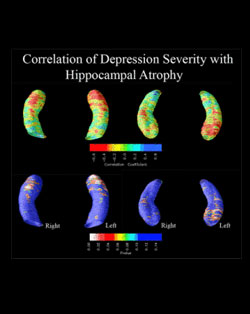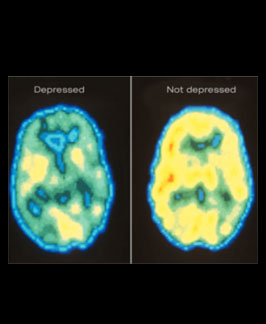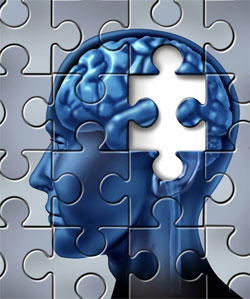Depression Isn’t A Choice, It’s A Kind Of Brain Damage
 After years of debate, researchers finally determined that persistent depression causes brain damage, and not the other way around. Neurologists previously had hypothesized that brain damage was a predisposing factor for chronic depression, but a new study published in Molecular Psychiatry sheds a different light.
After years of debate, researchers finally determined that persistent depression causes brain damage, and not the other way around. Neurologists previously had hypothesized that brain damage was a predisposing factor for chronic depression, but a new study published in Molecular Psychiatry sheds a different light.
The study, which consisted of 9,000 individual samples, collected from the ENIGMA group, succeeded in definitively proving a causal relationship between persistent depression and brain damage. Magentic resonance images (MRIs) showed evidence of hippocampus shrinkage in 1,728 patients diagnosed with chronic depression compared to the 7,199 healthy individuals partaking in the study.
Specifically, the study found that those patients diagnosed with major depressive disorder “showed robust reductions in hippocampal volume (1.24%) in MDD patients compared with healthy controls”.
What is the hippocampus?
The hippocampus is a small area of the brain that is located in the medial temporal lobe of the brain. It is comprised of two halves, one which resides on each hemisphere of the brain. It is generally agreed that the main functionality of the hippocampus encompasses the creation of new memories, the formation of long term memory, and spatial navigation.
Inside the hippocampus resides the amygdala. The amygdala is a part of the brain which has previously been linked with depression. Studies in the past have suggested a direct relationship between a shrinkage in the hippocampus and depression, but the sample size of previous studies hasn’t been large enough to yield definitive results.
The hippocampus and depression
 Researchers have found that in addition to its importance in forming and maintaining memories, the hippocampus is also pivotal in controlling emotions. Professor Ian Hickie, a co-author of the study and a renowned mental health campaigner, explains the hippocampus’ relationship to depression: “Your whole sense of self depends on continuously understanding who you are in the world – your state of memory is not about just knowing how to do Sudoku or remembering your password – it’s the whole concept we hold of ourselves”.
Researchers have found that in addition to its importance in forming and maintaining memories, the hippocampus is also pivotal in controlling emotions. Professor Ian Hickie, a co-author of the study and a renowned mental health campaigner, explains the hippocampus’ relationship to depression: “Your whole sense of self depends on continuously understanding who you are in the world – your state of memory is not about just knowing how to do Sudoku or remembering your password – it’s the whole concept we hold of ourselves”.
Professor Hickie further elaborates on the relationship between a shrinkage in the hippocampus and changes in behavior observed in animals from the past: “We’ve seen in a lot of other animal experiments that when you shrink the hippocampus, you don’t just change memory, you change all sorts of other behaviors associated with that – so shrinkage is associated with a loss of function.”
Those who suffer from depression usually have low self-esteem and lack confidence in managing their daily lives. It is common for those suffering from depression to also have a deflated ego, which simply refers to an individual’s sense of self. This could potentially affect how one forms memories, and how they view themselves in the past and thus project themselves in the future.
What is depression?
Depression is a seemingly hopeless state of mind where one takes extremely pessimistic thought patterns as reality. The key word is “seemingly”. Someone who is depressed generally has a deflated sense of self and a faulty perception of the world around them and how they view themselves in it.
Most of the times, the state of depression manifests through repetitively regretting your past and fearing the future. It is not a singular conscious choice. It is in fact a consequence of repetitive thought patterns that results in a negative outlook on life and one’s self in it. A negative outlook and thought cycle only leads to more negative thoughts without some form of intervention. Sort of how an avalanche only goes faster and gets bigger when careening down a snow-covered mountain.
These statistics concerning hippocampus reduction are intriguing as one could argue that the reduction in the hippocampus parallels this change in thought pattern. Couldn’t it be harder for someone with even the slightest reduction to step out of this negative thought cycle without the full capacity of their brain?
Change Your Outlook
 For many, the journey to overcoming this condition started when they accepted what their misguided thoughts were telling them for what they were – thoughts.
For many, the journey to overcoming this condition started when they accepted what their misguided thoughts were telling them for what they were – thoughts.
One simple, but effective tool in breaking free from depression is to get in touch with the present moment. Meditation and other yoga practices are essential in this respect.
Surrounding yourself with positive individuals is also extremely beneficial in overcoming depression. Sometimes when someone is depressed they simply cannot see the light at the end of the tunnel or find any hope in their life. That doesn’t mean that those around them can’t show them it’s there though!
Depression in the United States
Depression is not something that should be taken lightly. From 1999 to 2010 the suicide rate in the United States amongst Americans between the ages of 35 and 64 has increased over 25%. Additionally, a Centers for Disease Control and Prevention report that spanned from 2007 through 2010 found that almost eight percent of individuals 12 or older suffer from depression.
In the past, depression has often been thought of as a lifestyle that people are just too weak to climb out of. Other people might incorrectly assert that depression is a sign of mental weakness.
Whether depression is a disorder or disease doesn’t matter much. The fact remains that depression is a debilitating condition that drastically affects the lives of millions of people all over the world.
yogaesoetric
April 25, 2017
